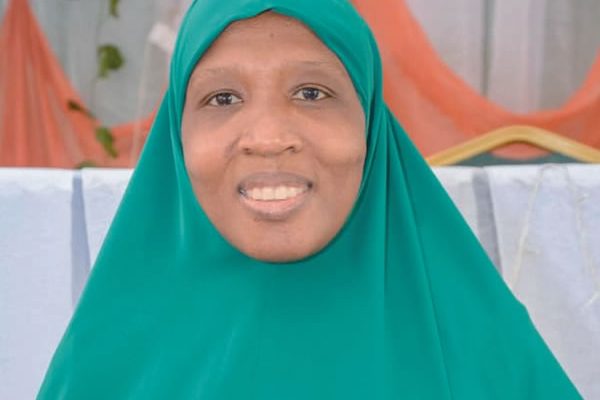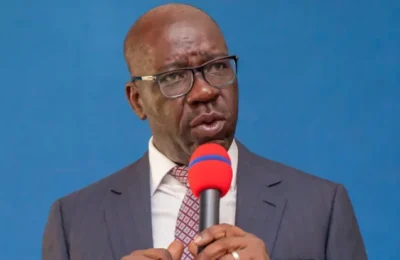
AWAU ADEGOKE

Dr Mariam Lawal is a sickle cell warrior and a pharmacist with the University College Hospital (UCH), Ibadan, where she holds the post of deputy director of Pharmaceutical Services. She is also a Fellow of the West African Postgraduate College of Pharmacists. In this interview by AWAU ADEGOKE, she speaks about her experience living with sickle cell, the stereotypes associated with sickle cell disorder, among others.
Tell us about your education and profession.
I grew up among my siblings of the same parents, all boys. I was the only one among them with the SS genotype. My parents later got to know they were AS and my brothers AA.
Unlike some of my mates who attended nursery schools, I started formal education in primary 1. I changed schools three times at the primary level due to my health challenges — sickle cell disorder (SCD). I finished secondary school in 1995, and gained admission to study Pharmacy at the University of Ibadan. Due to my glowing performance, and being among the best graduating students, my parents and lecturers encouraged me to further my studies. So, I returned to UI for my MSc and PhD in pharmaceutics, which I finished respectively in 2006 and 2015. I enrolled for a fellowship and concluded it in 2023.
I am a pharmacist with the University College Hospital (UCH), Ibadan, where I hold the post of deputy director of Pharmaceutical Services. I am also a Fellow of the West African Postgraduate College of Pharmacists.
Many people still do not believe that sickle cell is not spiritual and can be prevented. What is your take on this?
Since time immemorial, stereotypes have existed where people and conditions are poorly understood. SCD is not an exception. The spiritual association of SCD started in olden times. The survival rate of SCD was quite low and the affected individuals usually died young because of lack of proper care. Being a genetic condition, the same parents had many such children who frequently died in childhood. Traditionally they were called ‘Ogbanje’ in Igbo because they were thought to be spiritual children who had reincarnated. The belief cuts across cultures. The Yorubas called them ‘Abiku’, meaning ‘born to die’. Today, the spiritual associations with SCD still exist. Some people think SCD warriors are possessed beings or subjected to curses.
Even some educated people hold such beliefs. I recall an encounter with a colleague while undergoing my internship years ago. This colleague believed that the SS genotype could be changed to AA by attending a ‘deliverance’ session in a church. I just shrugged it off because I was expecting a better understanding from my colleague. Some people still believe that people with various illnesses and diseases are being punished for their imaginary sins. When people are better enlightened, they will understand that SCD is a genetic condition, which is also very preventable by correct matching of intending couples.
Do you think the government — federal, state, and local — is doing enough to create awareness of the problem of sickle cell?
I believe governments at all levels still have a lot to do to create adequate awareness of SCD. There is still poor orientation at the grassroots and that is why the misconceptions about the disorder still stand. We are supposed to have a National Sickle Cell Centre and six reference centers in the six geopolitical zones in the country, but their presence is not felt. Much of the work on the awareness is done by non-governmental organisations (NGOs) and sickle cell foundations operated by concerned individuals and groups as well as SCD warriors themselves.
Due to poor awareness, many SCD warriors suffer stigmatisation. Many are misunderstood even by their family members. Sometimes, medical personnel, who should ordinarily offer them succour are the culprits. This leads to a new set of problems for SCD warriors, the psycho-social issues.
The government can begin efforts on awareness in schools, markets, and other public spaces, as well as in the media. Schoolchildren can be enlightened on SCD by incorporating it into the secondary school curriculum, in subjects like Biology, where genetics is discussed. They should be enlightened on the need to know their genotypes and how they match for compatibility.
At the universities and NYSC camps, the orientation should be intensified. Young intending couples should be mandated to know their genotypes and ensure compatibility before marriage. The state and national assemblies can also legislate on this to reduce the burden of SCD.
As a sickle cell warrior and advocate, how would you rate your success?
As a sickle cell warrior, my immediate goals have been to stay strong and positive with the disorder, to thrive with it and also to influence other warriors positively. My urge to begin advocacy started more recently. Previously, it had been more of a personal thing. It took me this long to come out of the shell I had been living in. I am an introvert and like minding my business. However, while I don’t talk much, I write more and express myself better in written forms. So, the idea to write the book about my experiences with SCD came up in my fourth decade of life. And this is because I am unhappy with the pitiable condition of many SCD warriors.
Many warriors are struggling, barely trying to survive. The goal is to motivate more warriors to thrive, to be achievers and to believe in their abilities despite the challenges of the disorder. So, my first bold step towards advocacy began with the publishing and launching of my first book, ‘Phases: Memoirs of a Sickle Cell Amazon’.
This book will motivate warriors with the true accounts of my experiences with SCD. After launching the book, I knew I had to do more to raise awareness because eyes would be on me as an author. I intensified these efforts by regularly posting on social media, mostly Facebook. Since then, people have been reaching out to me. Some invite me to give talks while others ask me to mentor their warriors. So far, I think my efforts have been worthwhile.
What were your sad and happy moments in the book?
My book is truly an account of my various experiences living with SCD. Let me start with the unhappy experiences. These include when I was taken to the intensive care unit (ICU) due to acute chest syndrome (ACS) shortly after delivering my first baby. Also the day I learnt my second baby had died in the womb, and I was already 33 weeks gone. When I heard my father had died, and I was in hospital at a critical stage of my third pregnancy and couldn’t be at the funeral. The fact was hidden from me until after the burial.
There are also happy moments. The day I successfully graduated with distinctions as a pharmacist and was recognised with awards during our induction. The day I got married to my loving husband. The day I was discharged from the ICU and reunited with my first baby after the battle with ACS. The day I successfully delivered my third baby alive and well.
You attended the highest level of education and currently have a good career. How would you describe your journey to the top?
I agree that I have gone a long way despite sickle cell challenges and my hearing impairment, which also developed as a result of the disorder. However, I wouldn’t say I am at the peak. I still aspire to greater things, and in sha Allah, I won’t stop at what I am now or where I am now. I like dreaming big and working towards those dreams. I am grateful to Allah for His mercies in my life. He has enabled me to achieve many tall dreams that some people thought were unachievable by an SCD warrior.
Gone are the days when SCD warriors were seen as non-achievers. In fact, the typical SCD warrior has the potential to excel with the needed support. The challenges a warrior will face are huge, hence the need for a support system.
A strong family support base is crucial for warriors to thrive and stay positive. I enjoin parents to be more involved in understanding the hurdles their warriors face and help them overcome their difficulties. Spouses should be emotionally available, supportive, and understanding too.
Socially, warriors need the support and understanding of those in their communities. My experience with bosses and colleagues at work shows that if you are not secretive about your health challenges, more people are bound to show empathy than one who bottles everything up, creating an atmosphere of suspicion. I have spent close to two decades in my current place of work and it also took time to build on the confidence and trust my bosses reposed in me. This is the kind of support system SCD warriors need to grow and fly.
Does culture influence the lives of sickle cell warriors or carriers?
Culture may not be very supportive of the campaign to end sickle cell in Nigeria. One thing is that our people are very superstitious. As I mentioned earlier, many people believe that our problem is spiritual. Some people recommend consulting herbalists, occultists, and attending deliverance sessions for a solution to the disorder. Some will recommend some herbs you must use to overcome your crises. Yes, I have also encountered such people. They will tell you that you are not doing enough. These people don’t want to appraise the genetic basis of SCD. They feel that you can be magically cured. I urge warriors to run away from such people. They can drive you crazy. They can make you start believing that you are cursed and responsible for your own problems. You can quickly lose your self-worth by dancing to their tunes.
Science has shown that some herbs are actually helpful in managing sickle cell symptoms, but none has ever offered a cure because the disorder is based on genes which do not change once you are born.
In some cultural settings, myths about sickle cell have been passed on through the ages. There is one popular myth I got to learn about from my mother. It said that if a sickle cell warrior survived to 21 years of age, they would never experience crises again. Trust me, to hope on that, it never came to pass.
Another aspect of culture is the expectations of gender roles. In our cultural society, men are expected to be physically strong and active in running their homes. However, some men are sickle cell warriors and may not have that much physical strength and the level of stamina required to perform some cultural roles expected of them. In such cases, their peers may jeer at them and call them less manly.
In the case of women, giving birth and rearing children is one of their prime cultural roles. If a woman is constrained by the health challenges of sickle cell and unable to have as many children as expected, she may also be looked down upon. These are some of the cultural problems faced by warriors.
How would you advise the government on the health sector?
First, I would call on the government to revive the National Sickle Cell Centre and the outreach centres in the six geopolitical zones. These centres must be well-equipped to efficiently cater for the over four million population of SCD warriors in the country. I would ask the government to set up a special insurance scheme to cater for the healthcare needs of SCD warriors.
The government should be actively involved in raising awareness about the disorder through various media. Government should also subsidise genotype testing and regulate the conduct of these tests to ensure that accurate results are obtained from the laboratories.
How do you unwind?
My interests include reading, leisure writing, travelling, and shopping. As I don’t live in the same city as my husband, sometimes I do go and spend my vacation with him. He also visits home regularly. That’s how we roll.
ALSO READ: JUST IN: Oba Olakulehin gets Staff of Office as 43rd Olubadan







